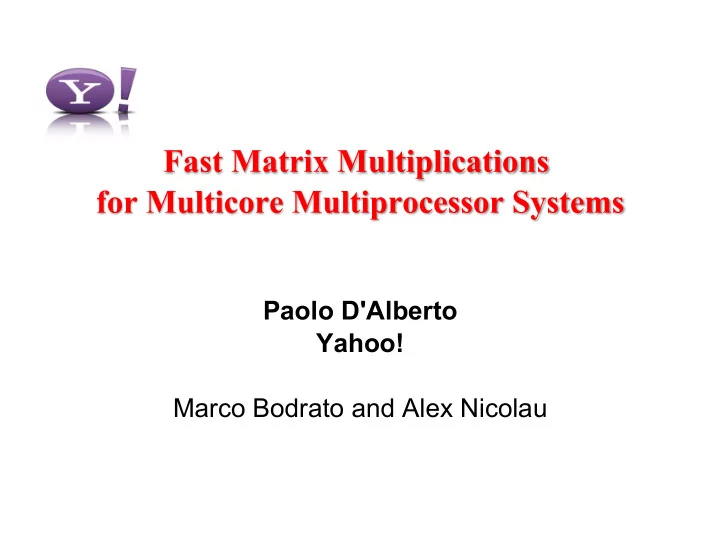

Paolo D'Alberto Yahoo! Marco Bodrato and Alex Nicolau
FastMM: A library of fast algorithms for MM and its performance, for different machines, types and sizes - Fast Algorithms: 3M, Strassen, Winograd - Types: single, double, single complex, and double complex - Problem size: 2,000 – 12,000 The algorithms are hand crafted - The development and engineering is automatic
Performance - Algorithm design + development + system based optimizations - There is no dominant algorithm We show that : - Our new algorithms translate to simple code - Algorithm design, development and care for system optimizations can be done naturally using recursive algorithms
There is NOT a single algorithm that is always better - You may say that there is no good solution because there is not a single solution - Why bother ? If you don't: you may miss the Gestalt's effect of algorithm design and algorithm optimization - You may lose a 30% speed-up I am not here to preach for any specific algorithm
Take any BLAS library: MKL, ATLAS, GotoBLAS - E.g., GotoBLAS - 90-95% of peak performance Nehalem 2 processor system (16 cores), 150 GFLOPS for single precision matrices Performance equivalent to a Cell processor - Further improvements are very hard We have the perfect computational work horse - We can build complex applications on it - We can build fast MM We do not compete with BLAS, we extend BLAS
Though there is no dominant algorithm We have an arsenal of algorithms 1. We can fit to the occasion We have algorithm optimizations 2. We can fit to the system Neglecting these, we may lose up to 30% 3. performance On average, the accuracy is not too bad
Algorithm implementation and choice done automatically - Expand the set of fast algorithms - Similar to what has been done for FFT - Automate the process and development of hybrids methods Numerical correction - Discover, develop, and deploy techniques for error reduction
Recommend
More recommend